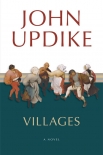Villages, John Updike [brene brown rising strong .TXT] 📗

- Author: John Updike
Book online «Villages, John Updike [brene brown rising strong .TXT] 📗». Author John Updike
Not even bothering to urinate or brush his teeth, Owen goes in search of her. She is not in the upstairs TV room or at her desk in the spare bedroom. Panic begins to flutter and flip in his stomach. Nor is she in the kitchen, which he approaches by the back stairs, silently, barefoot, the new carpeting pressing snugly, springily back against his soles. The television set, where the Weather Channel, her favorite, was wont to sparkle, is blank, a deadly green-gray. The cry “Julia!” is rising in his throat when a rustle of paper reveals her presence downstairs in the library. She perches on the red sofa, eating yogurt from its plastic cup and reading the New York Times. Her blue flip-flops rest on the edge of the coffee table, and the undersides of her thighs are exposed by her shortie nightie and open bathrobe. He sits down heavily in the wing chair opposite her, with the relief of a traveller who has found his way across a desert. The panic tickling his stomach eases. Her toes in the flip-flops look from his angle like two chains of pink circles. The muscles in her treadmill-toughened legs chase one another like smoothly sporting dolphins. He marvels at how keenly her beauty still strikes him, as she glances up from beneath her arched black brows with those wide-set aquamarine eyes, her lips slightly gleaming from the yogurt. Her lips never look numb or frozen, but always decisive, trim, sharp at the edges even without lipstick.
“Take off that absurd hat,” she says.
It has become his habit, as his hair has thinned, to wear a wool watch cap to bed, well into the spring. His mother in her last dotage did the same. Even on a hot summer night he misses its embrace of his skull, and resorts to it if he has trouble sleeping.
Obediently he removes the offensive item, tucking it under the armpit of his sleep-rumpled pajamas, and, thinking fondly of his wife’s feet, reaches toward them with his naked own, resting them on a Chippendale chair this side of the coffee table. A Wethersfield ancestor of Julia’s once did the badly faded crewelwork on the cushioned seat.
“And take your dirty feet off my antique chair,” she says, with what seems genuine indignation; the same indignation propels her up, off the sofa with her empty yogurt cup, down the hall into the kitchen.
He trails after her, protesting feebly, “They’re clean. They’re bare.”
“And why,” she asks in a pent-up voice, without turning around, “have you never learned to comb your hair? It was one thing when you had a lot of it and it was brown and fluffy, it passed for cute, but now it’s just this ugly little white washrag on the top of your head.”
“I just got up,” he protests, “and came to look for you. I didn’t want to take the time to comb my hair.”
In Willow, when he was a child, his hair was combed only before Sunday school or after a haircut, and no one complained. Or did his mother complain? Trying to remember, he has a faint, scratchy memory of a comb raking his scalp, perhaps his mother crossly tending to his hair before sending him off to school with that pack of Second Street girls. Even now, he fears anger in his mother’s touch, though she is more than ten years dead.
In the kitchen, Julia turns on the television set, where a weatherman, young, bushily mustached, and excessively lanky—the tall don’t do well on television—keeps lunging a bit too far with his white electronic magic pointer, which slides and scribbles over Ohio as he describes a zone of high pressure moving toward New England through New York State.
“Why do you keep watching this junk?” he asks, in cautious counterattack. “The weather will come no matter what you know.”
“Quiet!” she says, in the fierce tone with which his mother had once commanded, Don’t touch it! “Now you made me miss about the front!”
“The front will show up however it wants to, don’t worry so about it. Not even





Comments (0)